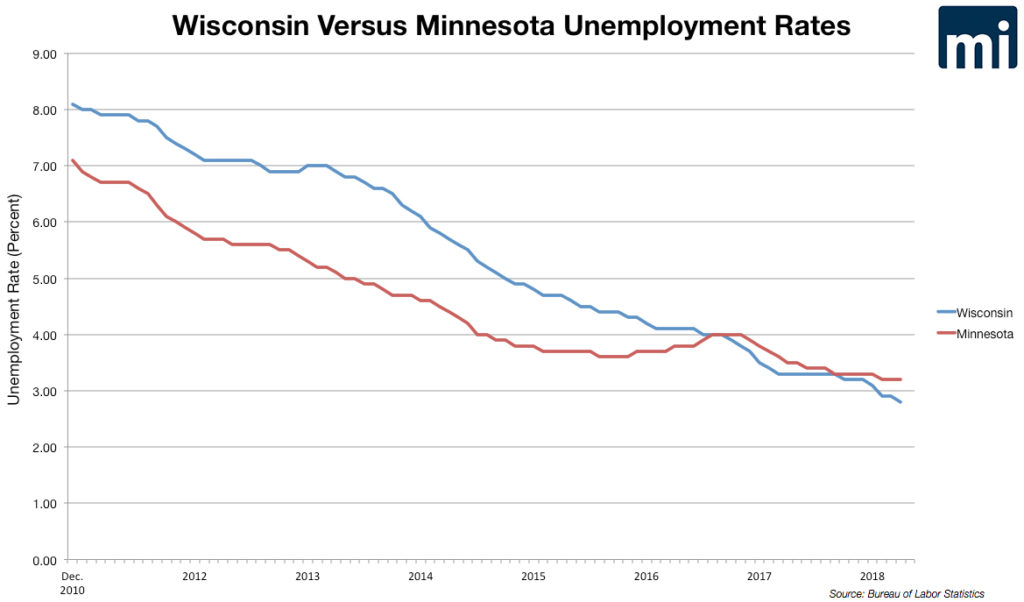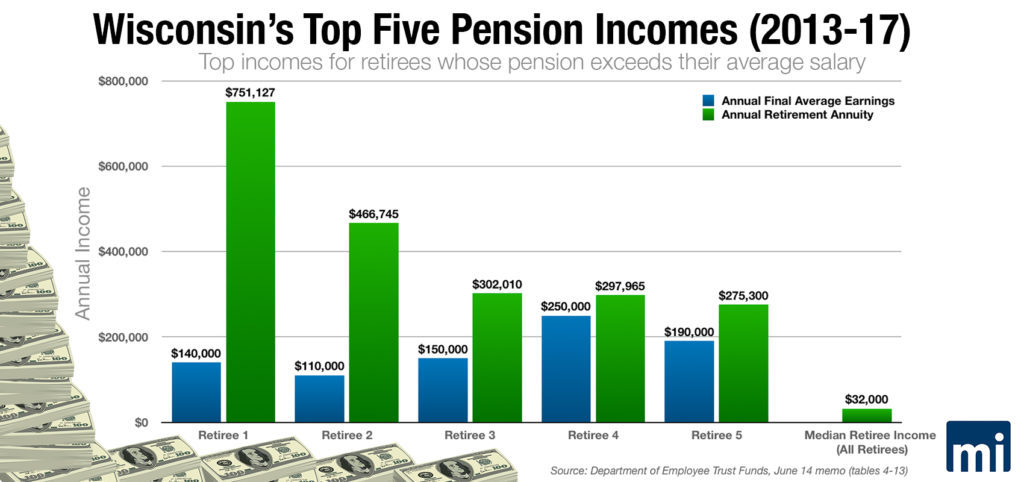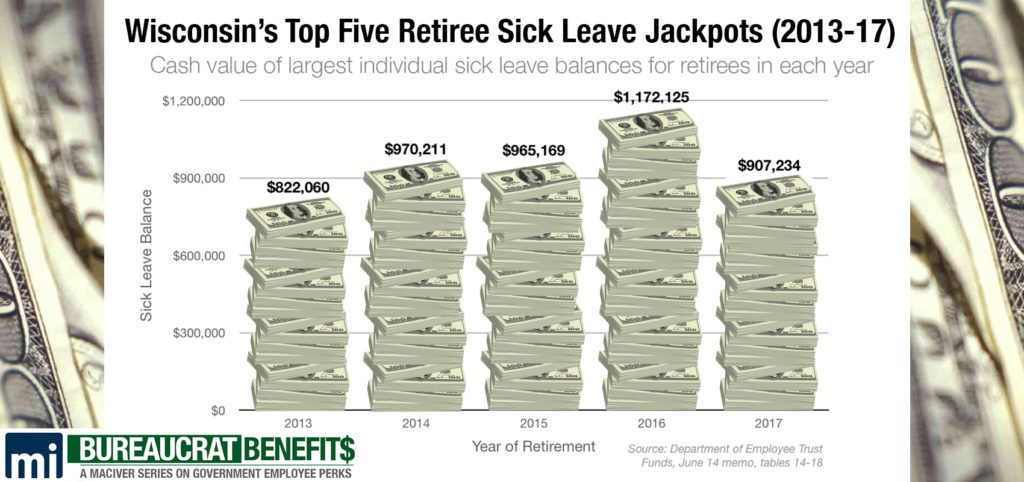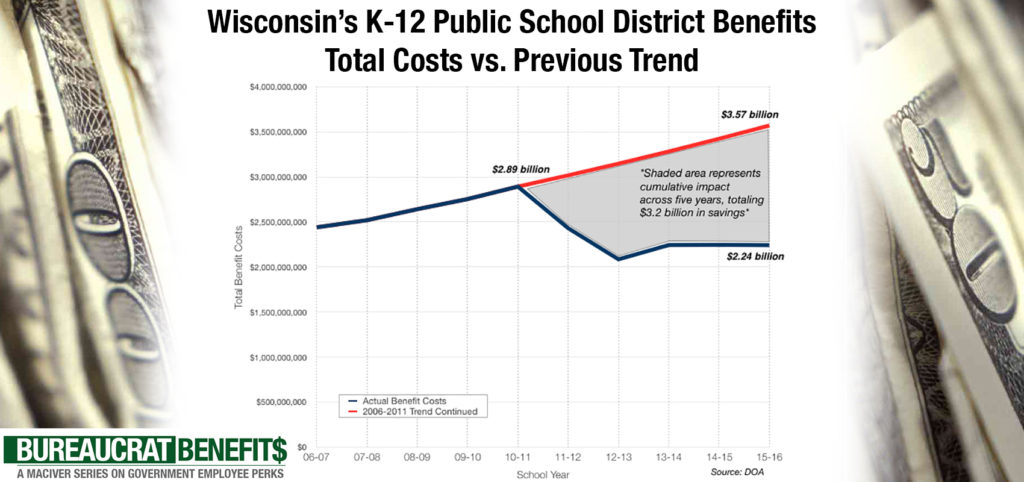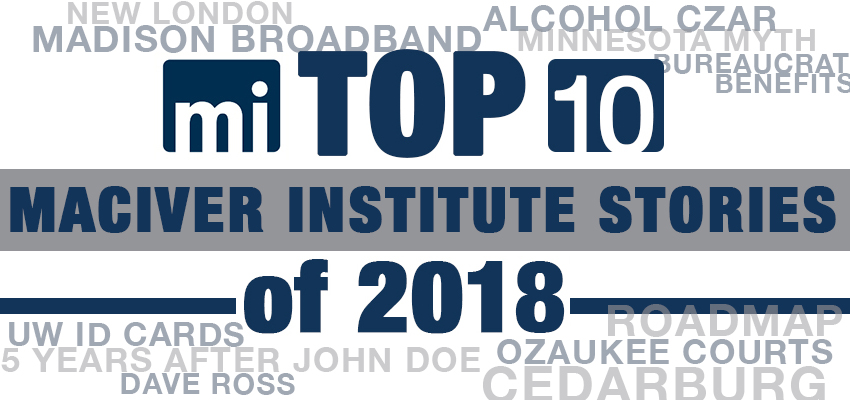
December 20, 2018
By Chris Rochester and Ola Lisowski
It’s been an amazing twelve months for the state of Wisconsin – and we, your ever-vigilant friends at MacIver, worked tirelessly (and sometimes around the clock) throughout the year to keep you up-to-date on the stories that shaped our state and our country.
From January to December, MacIver’s research, investigations, news, and commentary made a real difference in the public policy debate in our great state. That’s why it was truly a difficult task to pick the top ten MacIver stories over the past year, but using a combination of factors like popularity and real-world impact, we did just that for 2018.
Today we bring you our Top 10 MacIver Stories of 2018. From taxpayer boondoggles to liberty-stealing legislation, MacIver covered the stories the mainstream media refused to take on, investigations that had a tangible impact on the public debate, and special projects that will have a long-term impact on our state and communities.
In descending order, they are…
#10 – Disorder In The Court: Charges Of Misconduct In Ozaukee County Court
MacIver News Service broke this story and kept investigating for more than half a year.
In January, our first piece about disorder in Ozaukee County Circuit Court created some fireworks. Following MacIver’s story on allegations of misconduct, a chief judge launched a probe into the alleged dysfunction. The findings of that probe, however, came to no solid conclusion. While court insiders expressed concerns about the handling of files and program funding, a former judge’s investigation found plenty of mistakes were made but no clear criminal wrongdoing.
#9 – Cedarburg School Referendum Survey Raises Bias Concerns
Cedarburg School District officials dedicated a lot of time this year and last to securing the passage of a referendum asking voters to approve $59.8 million in new spending. However, some local citizens were critical of a potentially biased survey they contend was designed to show overwhelming community support whether it existed or not.
Thousands of documents obtained by the MacIver News Service through two open records requests showed how officials worked to tilt the results of a community survey the district commissioned to gauge interest in the huge spending spree. Concerned citizens criticized the survey as more of a marketing tool to justify the costly proposal.
MacIver’s investigation pulled the curtain from a process that many say is rigged against the taxpayers. One high-profile critic, radio host Mark Belling, took notice:
In the end, the referendum passed by a narrow margin. But when they’re writing a bigger check to cover their property tax bill in the coming years, taxpayers now know, in the immortal words of the late, great Paul Harvey, the rest of the story.
#8 – Five Years Ago Today: John Doe Raids Wisconsin
This is one Wisconsin should never forget.
Five years ago in October, armed officers conducted unconstitutional predawn raids on the homes of conservatives, including Republican strategist Deb Jordahl. On the morning of October 3, 2013, her children woke with deputies standing over their beds. For hours, officers searched their home while the family was forced to watch investigators root through their possessions. In fact, because of the secrecy order requirements of the John Doe law, the family was barred from publicly defending themselves for years at risk of going to jail. Scores of conservatives were targeted in the unconstitutional probe.
Less than two years later, the Wisconsin Supreme Court shut down what became known as “John Doe II,” an ill-fated attempt to link conservative activists with supposed campaign finance violations.
We hope this is a history Wisconsin won’t repeat anytime soon.
#7 – What Did New London Spend Its Wheel Tax Money On? Because It Wasn’t Roads.
MacIver has worked tirelessly all year and beyond to bust the mainstream narrative about transportation funding in Wisconsin. In 2018, we spent a lot of time reminding the public about a critical but often overlooked fact: the state government isn’t responsible for every single highway, road, street, and path in Wisconsin.
Local governments are responsible for local roads. However, they often don’t prioritize their own roads at budget time, with many choosing to simply blame Madison when potholes pop up in the city streets that they alone are responsible for maintaining.
That brings us to the City of New London. The northeastern Wisconsin city has a balanced budget this year, which includes $184,000 from its new wheel tax – but it spends only $18,000 on road work. So the big question is: what did New London spend its wheel tax money on?
Rather than going into a segregated account, it’s all being dumped into the general fund, according to the 2018 city budget. It’s all there in black-and-white.
As was the case in the Cedarburg referendum story, local officials didn’t like MacIver asking hard questions. They turned to their local paper, which gave cover to city bureaucrats whose questionable behavior so often goes unquestioned.
Rest assured – in 2019 and beyond, MacIver will continue to hold bureaucrats’ feet to the fire no matter where in the state they draw a salary.
#6 – It’s Back: Alcohol Czar Draft Bill Making The Rounds
It’s ba-aack. Every session has a piece of “zombie legislation” or two, and the 2017-18 legislative session was no different.
Originally covered as a last-minute potential addition into the 2017-19 biennial budget, this provision would create a new so-called “alcohol czar” to oversee enforcement of state liquor licenses. That brand new bureaucracy, the Office of Alcohol Beverages Enforcement, would essentially beef up the current protectionist three-tier alcohol enforcement system. That system separates the businesses of alcoholic beverage makers, wholesalers, and retailers. The new office would also get the ability to make warrantless arrests.
Other than the Badger State’s love of all things hops, why did this story get such big play in 2018? We think it’s because of people like William Glass – a veteran and small business owner who passionately made the case against protectionism in front of a senate committee hearing on the bill this year.
Watch the video for yourself to learn why Will has to volunteer at a business he started himself. Then, ask yourself why legislation like this keeps coming up time and time again.
#5 – Wheels Have Fallen Off Liberals’ “Minnesota Is Utopia” Argument
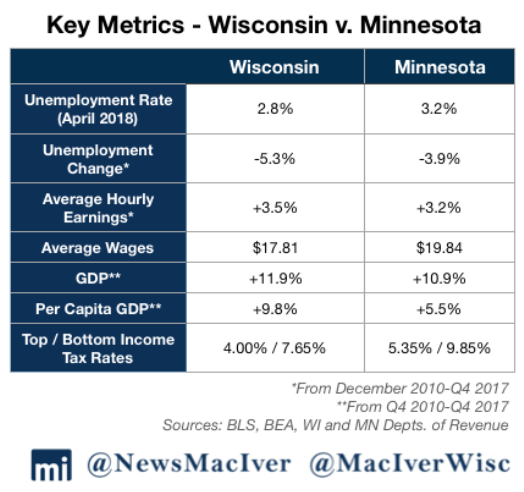 In the heat of a summer heavy with campaign rhetoric, one comparison kept coming back: is Wisconsin or Minnesota the better state? Packers vs. Vikings aside (let’s not talk about the Packers right now), the left’s obsession with giving Wisconsinites an unearned inferiority complex had us scratching our heads. The debate began in earnest when progressive think tank the Economic Policy Institute released a report comparing the two states’ economic recoveries since the Great Recession, arguing that Walker’s conservative approach had been outpaced by that of Minnesota’s liberal governor, Mark Dayton.
In the heat of a summer heavy with campaign rhetoric, one comparison kept coming back: is Wisconsin or Minnesota the better state? Packers vs. Vikings aside (let’s not talk about the Packers right now), the left’s obsession with giving Wisconsinites an unearned inferiority complex had us scratching our heads. The debate began in earnest when progressive think tank the Economic Policy Institute released a report comparing the two states’ economic recoveries since the Great Recession, arguing that Walker’s conservative approach had been outpaced by that of Minnesota’s liberal governor, Mark Dayton.
The problem? The report constantly moved the yardstick around and used cherry-picked data to advance a left-wing narrative. For one, it began its comparison of the states’ respective unemployment rates a full year before either governor took office and began implementing their policies. It also failed to use the same ruler, starting each analysis at the point of that state’s highest unemployment rate. That made the argument nowhere near apples to apples.
When you start at the same point in time, Wisconsin’s battle against unemployment has far outpaced that of Minnesota, even though Wisconsin started with higher unemployment.
By the time campaign season came around, the argument came up again, leading us to re-release this story to remind readers why they should be skeptical of the “Minnesota Myth.”
As MacIver so often does, we presented critical facts that people can put in their back pockets to use next time a liberal parrots the Minnesota Myth or tries to claim Wisconsin should’ve taken that “free” Medicaid expansion money.
#4 – Bureaucrat Benefits Series
2018 saw the launch of a new MacIver series, Bureaucrat Benefits. The series highlighted some of the excessive perks enjoyed by government employees and retirees. So far MacIver has put the spotlight on lavish pension payouts, jackpot sick leave conversion benefits, and the cost savings made possible by common sense reforms.
The Bureaucrat Benefits series first looked at generous pensions. In many cases, pensioners in Wisconsin earn more in retirement than they ever made while working – including one individual who collected $751,127 in annuity payments in 2017 – a five-fold increase from the $140,000 salary the former employee took home at the peak of service.
Wisconsin also offers state employees a generous sick leave conversion benefit. Employees average more than 16 paid sick days per year, and they can roll them over in perpetuity and convert them on a cash value basis to free health coverage in retirement. One 2016 retiree posted more than $1.17 million in sick leave balances – just one example of why this program cost $172 million in 2017 alone.
The third installment shows how benefits costs can be brought to heel. A MacIver analysis of new state data shows Gov. Scott Walker’s Act 10 reforms saved school districts $3.2 billion just in benefits costs since 2011, largely by allowing them to shop around for employee health insurance.
After the MacIver series and a concerted talk radio effort (below), lawmakers are starting to take note and momentum could be building for another shot at reform.
But bureaucrats beware: December 31 will not herald the end of our Bureaucrat Benefits series. We will continue investigating the costly, cozy life of bureaucrats at all levels of government in 2019 and beyond.
#3 – Madison’s Costly Broadband-For-All Plan Declared Dead On Arrival
A costly plan to build a government-owned fiber optic broadband network in Madison finally died in late summer. It went out “with a whimper and not with a bang,” according to a city official overseeing the process.
The city’s Digital Technology Committee in September approved a motion to not pursue a Fiber to the Premises (FTTP) network that had been in the works — mostly behind the scenes — for years. MacIver was there all along exposing the astronomical cost of the proposal, while nary a member of the mainstream media was to be found at most of the consequential committee meetings.
What the subcommittee ran into was financial reality. In June, the panel learned that the estimated expense to build a so-called “dark fiber” FTTP network was estimated to cost north of $150 million — $173.2 million all told when bonding costs are added in.
Persistent coverage by MacIver News Service and analysis by the MacIver Institute spanning several years were critical in shedding light on the true cost of the project, investigating similar projects around the country that ended in failure, and revealing the abject lack of any need for the city — one of the most digitally connected in the country — to pursue the project.
MacIver’s efforts to educate the public about the project’s costly reality ensured the city’s Digital Technology Committee felt critical pushback against their plans. Their city-owned broadband quest is dead, but MacIver will continue to be vigilant of any new schemes by the city’s tech bureaucrats.
#2 – UW Issues Voting ID Card To Non-Citizen
Opponents of common sense voter ID laws love to claim that the simple requirement that a voter bring a photo ID to the polls makes it so hard to vote, people just throw their hands up by the tens of thousands and resign themselves to disenfranchisement.
But a revealing MacIver video investigation injected some facts into the left’s hysteria. The report found that it’s actually so easy to get key documents required to vote that even a non-citizen international student at the University of Wisconsin-Madison could get a voting ID card, no questions asked. As part of a big GOTV push this year, the UW hosted three early voting sites and put extra resources into providing students with the documentation they need to register and vote. They apparently made it too easy.
The video shows the student, who is not a U.S. citizen and cannot vote, getting a university-issued voter ID card that’s only purpose is for use at the polls. Issuing the ID without proof of citizenship means the university removed the last line of defense against vote fraud. MacIver’s investigation is just further evidence that the concept of voter integrity is still taken far too casually in Wisconsin, even with laws like voter ID on the books.
That brings us to the MacIver Institute’s biggest story of 2018:
#1 – Assembly Democrats Unveil Roadmap To Permanently Change The Constitution
In March, Assembly Democrats, led by Rep. Chris Taylor (D-Madison) gave Wisconsinites a peek at their vision for the state. Let’s just say they didn’t hold anything back on this one. The roadmap includes 18 policy changes ranging from reinstating collective bargaining to bringing back straight-ticket voting. Democrats didn’t just propose passing laws for each idea, however — they took it a step further by arguing that each and every idea must be enshrined as an amendment to our state Constitution.
Step one on the list would allow local governments to regulate gun policy, effectively gutting the right to keep and bear arms and compromising the state’s concealed carry law. Number four on the list creates a “right to a living wage.” Democrats have long moved past a $15 per hour minimum wage, arguing that in places like Madison and Milwaukee, even that wouldn’t be enough. Surely, enshrining such a vague promise in our Constitution won’t cause a runaway train. Number eighteen enshrines the right to collective bargaining, giving public and private workers the constitutional right to “organize and collectively bargain through representative of their own choosing on subjects including but not limited to wages, hours, and working conditions.”
The roadmap would also reinstate the Government Accountability Board (GAB), resurrecting an institution that unconstitutionally spied on Wisconsinites and violated their rights. What’s more, the plan would give the GAB even more power than it previously had, granting it the power to draw election maps. Surely, this political weapon of the left wouldn’t crush the rights of average citizens, as it did again and again.
Sometimes, all you have to do is let progressives speak for themselves. We did, then we wrote about it in a powerful analysis that caught fire on social media and on airwaves from Lake Michigan to the Mississippi. Take a look at the roadmap here, and you’ll see why this MacIver exclusive got such big play in 2018.
Because of its reach, the way it fostered an important public debate, and the critical information it contains that no one in the mainstream media wanted to discuss, our report on Chris Taylor’s list of radical constitutional amendments is MacIver’s top story of 2018.
—
There you have it – the top ten MacIver Institute stories from 2018. Keep an eye on MacIverInstitute.com in the coming weeks for further editions of our annual top ten lists, as we continue reviewing the year that was.

